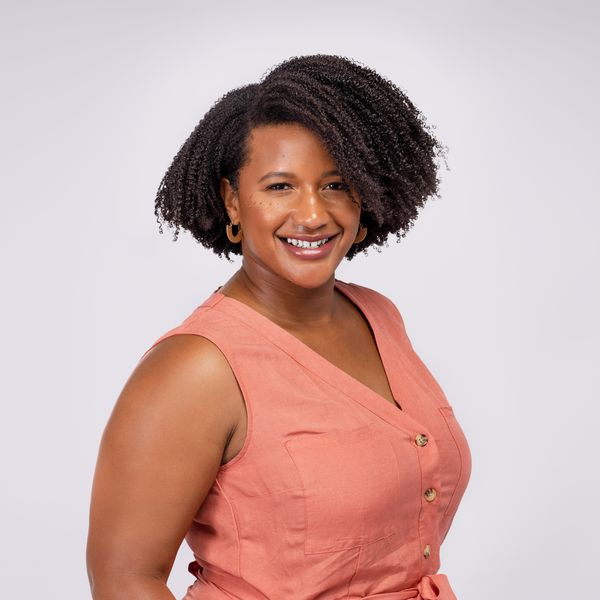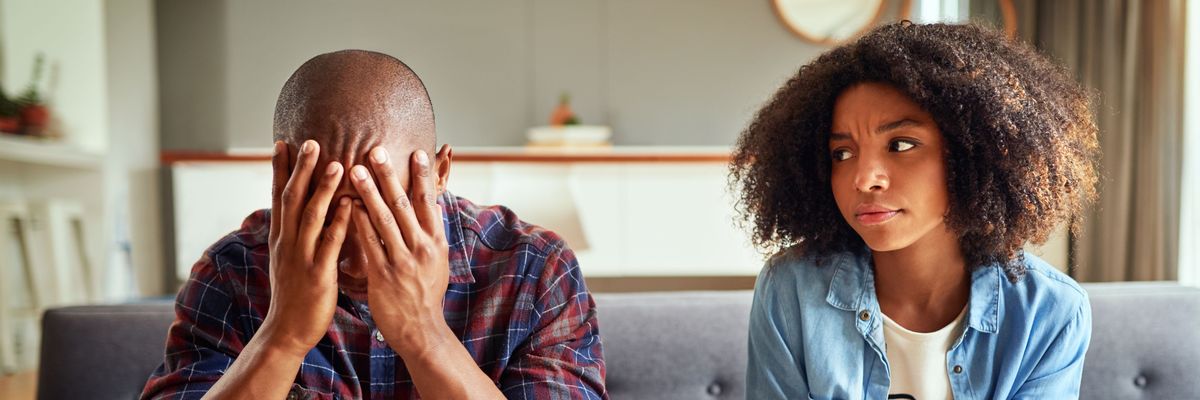Transparent Black Girl Founder Yasmine Jameelah Is Redefining Wellness For Black Women

Black Woman Owned is a limited series highlighting black woman business owners who are change-makers and risk-takers in their respective realms. As founders, these women dare to be bold, have courage in being the change they wish to see in the world, and are unapologetic when it comes to their vision. These black women aren't waiting for a seat, they are owning the table.
In this life, there's work that we choose to pursue and work that chooses us. For Yasmine Jameelah, founder of Transparent Black Girl, this work was brought on by pain, growth, and healing that empowered her to take wellness into her own hands.
It was in the early stages of college that Yasmine experienced this shift. Pulled by the incarceration of her father while experiencing abuse in a relationship and deep depression, her world was flipped upside-down. Although Yasmine didn't have the language to self-declare these hurdles as the catalyst to her wellness journey, there was one thing she knew for certain, "I needed to get my sh*t together and I wanted better for myself," she says.
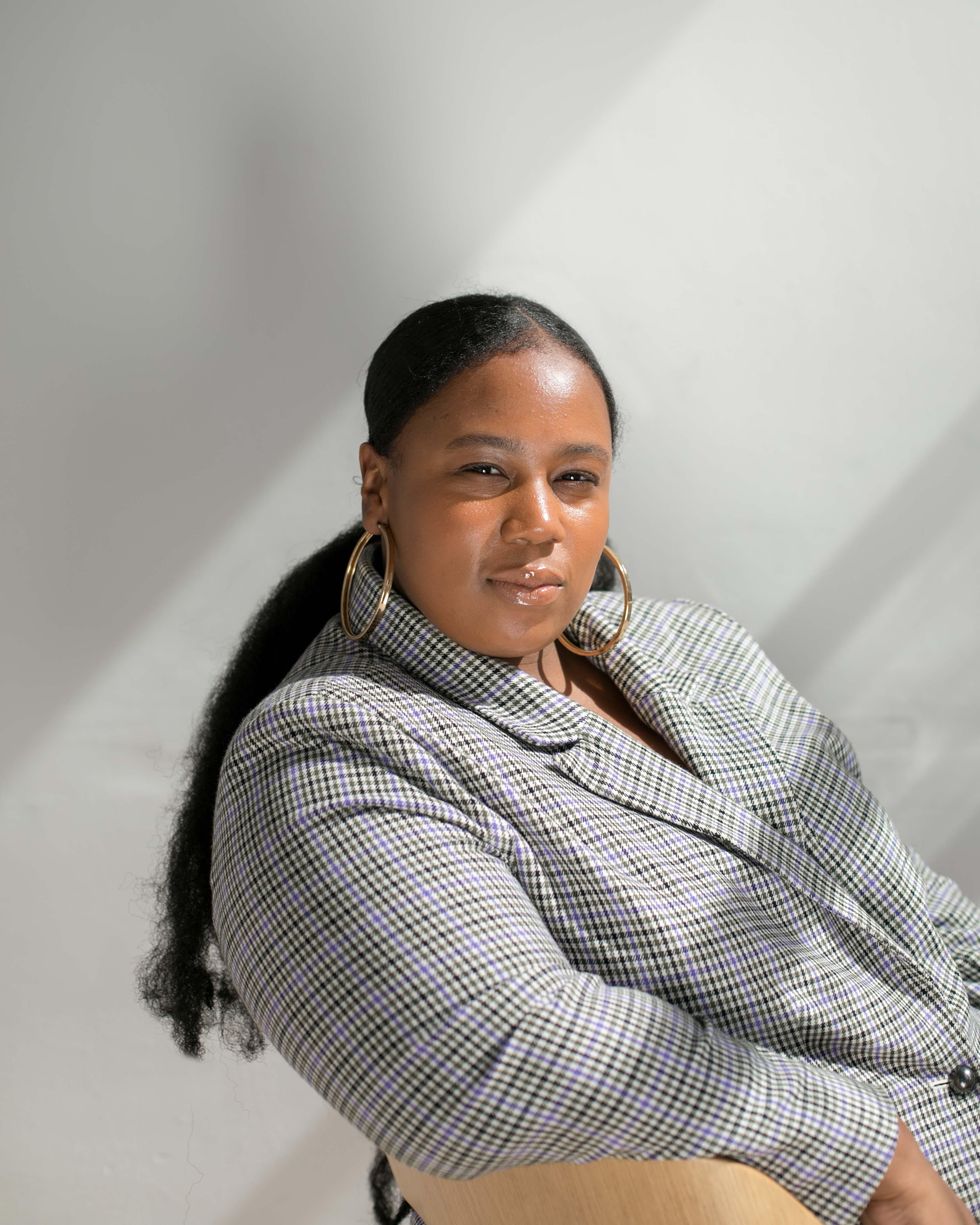
Photo by Camille Shaw
Courtesy of Yasmine Jameelah
Better came wrapped in the form of therapy. She started documenting this journey on her personal blog, Meant to Be Yasmine, where she opened up about her experience in therapy and holistic weight loss with her community. Through this exchange, she noticed a common thread in how her readers would relate to her stories. "They'd always say, 'I love how you're so transparent.' It was just everyone's favorite word to describe me."
Once she noticed this communal response, it became clear that the work Yasmine was pursuing was beckoning her to expand. Soon, she realized that her lone place for healing was in purpose to honor Black women and their journey to become who they were meant to be. "I wanted to do something bigger for more than just myself." Funny how God interprets our plans.
When Yasmine started her digital community, Transparent Black Girl, the small but mighty tribe was made up of 300 followers. At the time, social media was in a shift where positive content was resonating more, and Yasmine took notice. "I just started to post these memes like, 'Me: alkaline water, my flourishing bank account, consistent men, my grandmother's prayers,'" and it caught fire. After a viral post, the platform skyrocketed in its following, and it was at that moment that Yasmine knew she had something special and timely on her hands.
Today, Yasmine is on a mission to empower Black women and men to define their wellness journey on their own terms via a wellness collective called Transparent + Black. The space is unique in that it offers an accessible and equitable ecosystem for Black people to heal. As Yasmine puts it, "With trauma, it's important to address that there's no collective healing unless we address the collective trauma that we all share as a people."
For decades, society has given Black folks molds to fit into in order to belong in certain spaces, but when it comes to mental health and intergenerational healing, Yasmine's purpose is clear, "Wellness is as multi-faceted as we are."
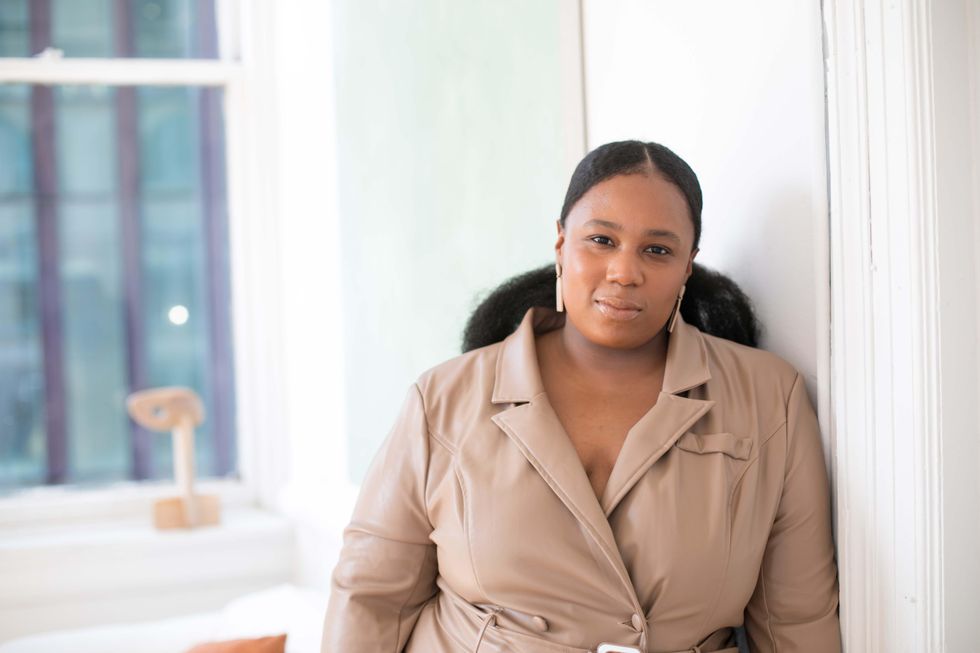
Photo by Camille Shaw
Courtesy of Yasmine Jameelah
xoNecole: You’ve mentioned that “you didn’t find wellness, wellness found you.” Take us back to that season. Where was Yasmine when wellness found her?
Yasmine Jameelah: The older I get, the more I realize that, in many ways, wellness was always inside of me. When I turned 18, I hit a really deep depression. My father went to prison, I gained over 100 pounds, and I was extremely depressed. And while most people spend their first few years of college having the time of their life and having all of this fun, I spent the first few years of college isolated. On the weekend when my friends would be going out to clubs, I was visiting my father in jail. While that was happening, I found myself in a really abusive relationship, and to say the least, my life was a hot mess.
What changed everything for me was therapy. I decided that I just wasn't happy anymore and at that point, I didn't really have the language to be like, 'This is a wellness journey.' I just felt like I needed to get my sh*t together and I wanted better for myself. I finally decided that I was going to leave the [abusive] relationship and go to therapy. I found a therapist and that opened up so many doors for me.
Why was it important for you to place an emphasis on transparency, not only for yourself but for the women who make up the Transparent Black Girl collective?
I'm like a real-life transparent Black girl, so if anything, I think that this space has allowed me to be comfortable in that. Since I was a kid, I always felt like I shared too much, so this has been a space where I have felt power in owning every part of who I am. While I am transparent, the older I've gotten, I have become more selective about who I share with and even how I share. The days of me being a blogger and talking about so much, I don't even share to that magnitude anymore. But there is still so much vulnerability that goes into what I share with our followers and with the women that we meet when we have events in real life.
How have you found power in your transparency?
I just feel like it's given me confirmation that God made me the way that I am for a reason. I used to feel embarrassed about being so transparent. I used to wish I could be like people who were super-selective and who didn't share their feelings and weren't open books. But I think redefining Black wellness and owning who you are is a part of wellness. I went from being really embarrassed about being such a sharer to finding a lot of strength in it. The goal is to remind yourself that being a Transparent Black Girl is to allow yourself not to shrink, own who you are as a woman, embrace your inner child, and know that there's a healer in all of us.
"For one Black woman, [wellness] can be you aligning your chakras and getting into tarot cards. For another, it may be you going to church, driving the boat occasionally, and going swimming—like myself. It's important that we honor all those experiences and not make it seem like one is better than the other."
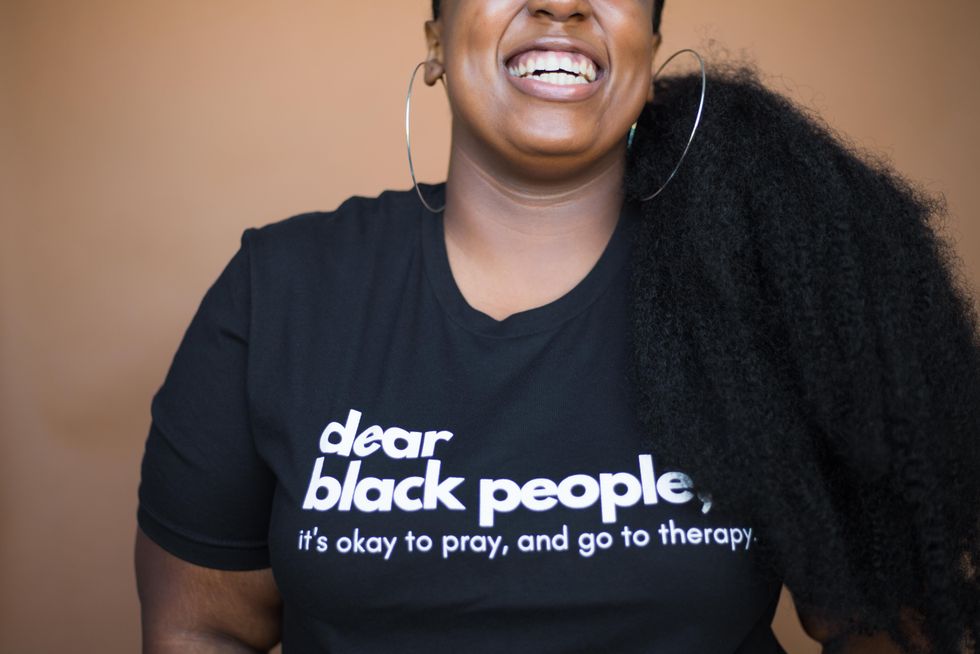
Photo by Camille Shaw
Courtesy of Yasmine Jameelah
The work you do can be heavy at times. How have you been able to find joy while balancing what you do in this space?
Although these conversations can be heavy, there are so many beautiful opportunities that you can find to heal from trauma and there is so much joy that you can experience along the way. I have recently decided that I was going to own traumatic experiences, and while they are painful, there are so many happy moments that can occur because of them. For example, because of my weight fluctuating and having so many years where I did not feel comfortable in my body, I find so much joy in twerking, owning my sexuality, and having fun trying on different clothes. That is a joyful experience for me.
At TBG, we talk about all aspects of wellness and one of those things is Black joy. One day that can look like me going out with my friends to do yoga, but it can also look like driving the boat. So just understanding that this idea that wellness is always this meditative experience, it's just not true, at least not for me. I feel like we often believe that when we have lifestyle changes that everything has to change, and I'm just like Nah, I'm always going to have balance. I'm so grateful that our community has also leaned into that too, just understanding that this is not always going to be this super meditative experience all the time and that we're going to have fun and tend to ourselves. That might look like matcha in the morning and D'usse in the evening, and that's totally fine.
In the three years that you’ve been pursuing collective healing through Transparent Black Girl, how have you been able to redefine wellness for yourself?
I think duality is so important. When I first got into the wellness space, I was seeing women that were in the space, and, while they were doing beautiful work, all I saw them posting about was meditation, and I was like, 'I don't know if this speaks to me.' Even in terms of wellness, from the get-go, it's a very white-washed space. Because it is, we don't always feel seen and accepted. It felt like I was diminishing myself just to fit in, and I decided that I was going to have confidence and lean into owning all of the facets of who I am.
Even that was a healing experience within itself: to know that I am just as transparent as I am reserved. I find joy in the fact that I am just as confident as I am unsure about myself. That I am just as brave as I am afraid of things when times change. It's been such a beautiful journey to know that I don't have to filter any parts of my personality or how I show up in the world to receive God's best for me.
Last year was such a tumultuous one, one that served a great purpose, but left a lot of us fatigued socially, politically, and mentally. In that, how has your approach to Transparent Black Girl shifted?
It taught me two things and that was one, while I was building this space, I was not doing as good of a job taking care of myself in the process. While I thought I was doing a good job taking care of myself, being at home during the pandemic showed me that I really needed to double down on my self-care and be really unapologetic with it. I've been doing my best to pour into me first. It's a journey, but I'm definitely getting more confident in that.
I'd also say that in tandem, while I have learned to take care of myself more, I have also learned how to dream bigger. This last year was really difficult, and I felt at times, as a single woman and spending most of my time within the four walls of my room, I felt really isolated, but I also felt really affirmed. If I made it out of this year and made it out of all of the feelings that I was experiencing, it was for a reason. And once I collected myself, it was OK to dream more and that I could have clarity about what I was building.
"I am just as transparent as I am reserved. I find joy in the fact that I am just as confident as I am unsure about myself—that I am just as brave as I am afraid of things when times change."
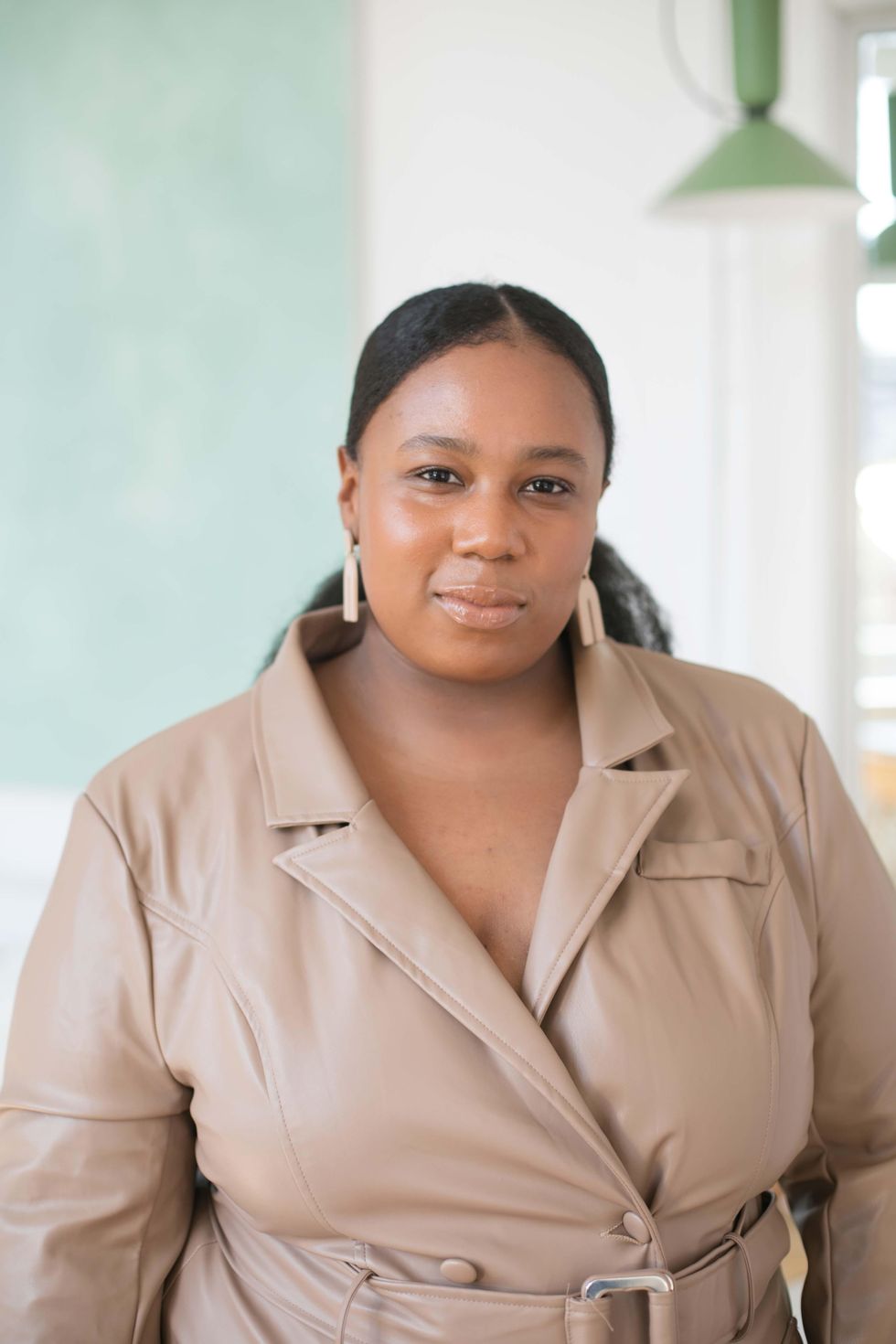
Photo by Camille Shaw
Courtesy of Yasmine Jameelah
How has swimming played a role in your healing and self-care practices?
I have loved to swim ever since I was a kid. I started to swim when I was about six or seven years old. My dad was really adamant about me learning to swim and just doing stuff that they said Black people couldn't do. While that was happening, I actually had a cousin the same age as me who drowned and pass away at the Jersey shore. When I got older and started to feel self-conscious about my body, I stopped swimming for a long time. I didn't swim again for over a decade.
When I got to college, I gained weight and was trying to lose it, and I injured my knee, so I had no other choice but to swim. My physical therapist and personal trainer were like, "You should swim." I still had this fear of people judging me because of the trauma that I experienced as a kid. When I started to swim again, I fell in love with it all over again. And I swim now more than I ever have. Not only did it help me lose weight, it became this beautiful experience, like another form of therapy. It's my favorite thing to do for myself. When I'm not swimming, I don't feel like myself.
Your collective, Black + Transparent, looks to address the Black community’s needs to cope with intergenerational trauma. How were you able to tackle this fear in your own journey?
There are so many layers of the trauma that we have but there are three things that, in terms of intergenerational trauma, have kept us at risk of certain things. [One] is access to doulas, as a result of slavery. If you look back in terms of doula work, how Black women are treated in hospitals, and how midwifery is still illegal in certain states, Black women were no longer allowed to practice. Also, so many Black people still don't know how to swim, and in terms of mental health services, we are still at risk more than anyone else.
When it came to deciding what I wanted to build, looking at all three of those experiences, those are three things that we are still suffering from. So I wanted to make sure that in building a wellness space for Black people that it was rooted in the real work that we desired to address. Also, [it was important to] collaborate with intergenerational trauma therapists who are open to working with families and making sure that we're able to be just as transparent with our families as we are with ourselves and our own personal wellness journeys.
"Wellness is a very personal experience. Nobody can tell you how to be well for you, but you."
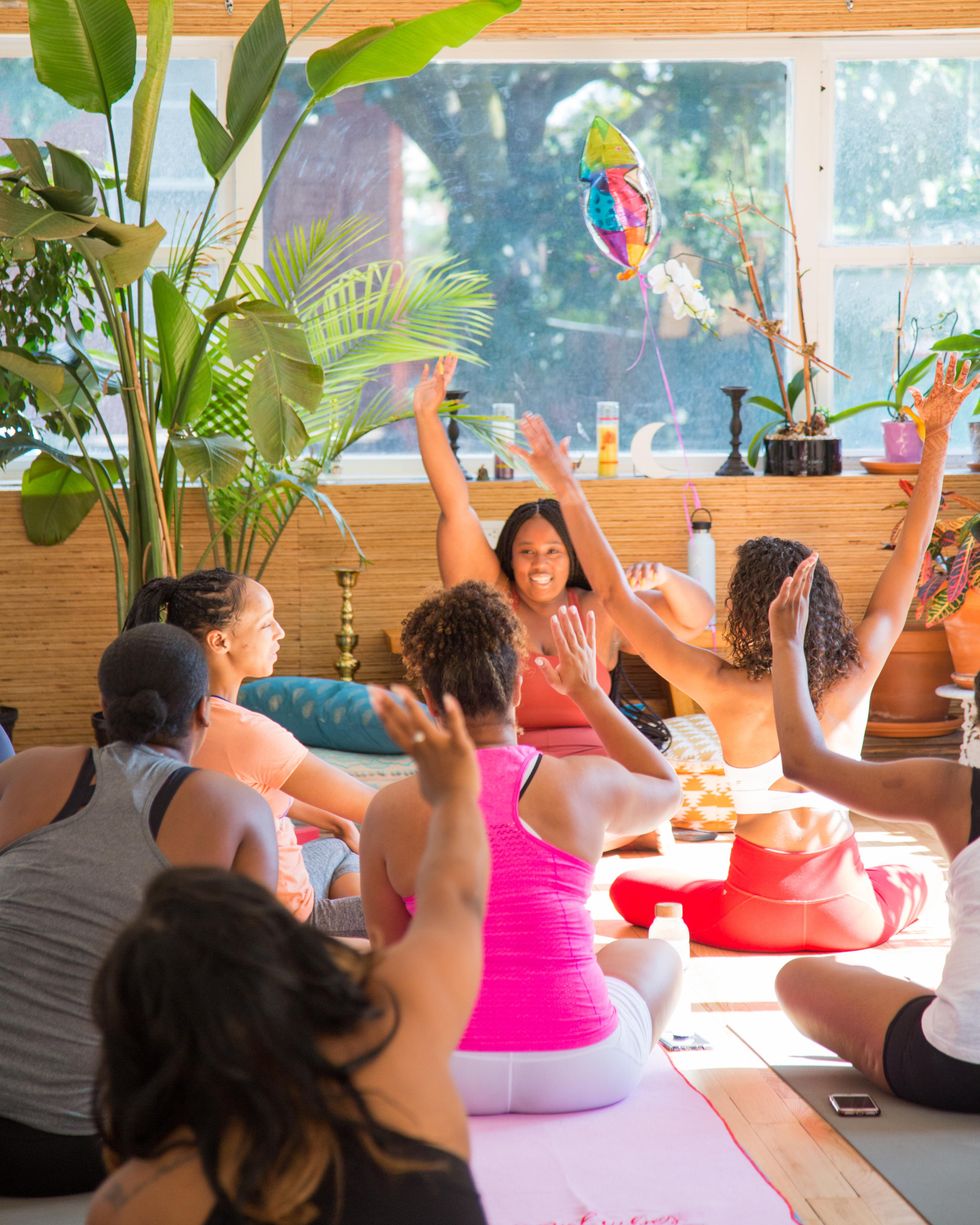
Photo by Camille Shaw
Courtesy of Yasmine Jameelah
What would you say to someone who is looking to create their own space of healing, whether through a collective or even therapy, but might be a little hesitant to start?
First, you need to know that you are worthy, even if you are in the lowest place in your life right now. I truly believe that I knew that I deserved wellness when I was deep into depression and contemplating suicide because I knew that I deserved better. That in itself is an act of wellness: knowing that you deserve better than your current circumstance. I would say that you're already on the journey if you know that whatever bottom you're in right now, you know that's not meant for you. Also, be patient with yourself. Know that while there are so many wonderful resources we can use, wellness is a very personal experience. Nobody can tell you how to be well for you, but you.
Join the Transparent Black Girl community by clicking here, and keep up with Yasmine Jameelah on Instagram.
Featured image by Camille Shaw
This Is How To Keep 'Holiday Season Stress' From Infecting Your Relationship
Hmph. Maybe it’s just me, but it seems like there is something really weird happening in the fall season air (because winter doesn’t officially begin until December 21) that cuddle season is in full swing while break-up season is as well. In fact, did you know that break-ups are so popular during the holiday season that December 11 is deemed Break-Up Day?
The reasons why relationships shift around this time vary; however, I did both roll my eyes and chuckle when I read that a very popular one is because it’s an easy way to get out of getting one’s significant other a Christmas present. SMDH.
Anyway, I personally think that the less shallow folks out here may contemplate calling things “quits” or they at least distance themselves a bit from their partner (and what I’m referring to is serious relationships) due to all of the stress and strain that oftentimes comes with the holidays whether it be financial, familial, due to their tight schedules or something else.
Listen, I would hate for you and your man to miss the fun and happiness of experiencing this time of year, all because you are so overwhelmed or irritated that you can’t really enjoy it. That’s why I have a few practical tips for how to avoid allowing the typical holiday season stress from INFECTING your relationship.
Manage Your Expectations
 Giphy
GiphyUnmanaged expectations. If there is a main reason why the holiday season tends to be so stress-filled for so many people, I’d bet good money that this is the cause. And when you’re in a long-term relationship, expectations can manifest themselves in all sorts of cryptic and/or unexpected ways. You might have relatives who assume that you are going to be with them for Thanksgiving or Christmas when you have other plans in mind. You might be thinking that you are going to spend one amount for presents while your man is thinking something totally different. When it comes to scheduling, your signals may be crossed.
And you know what? To all of these scenarios, this is where clear and consistent communication come in. Don’t assume anything. Don’t dictate anything either. From now until New Year’s, mutually decide to check in once a week, just to make sure that you are both on the same page as it relates to the holidays and what you both are thinking will come along with it. The less blindsided you both feel, the less stressed out you will be. Trust me on this.
Set (and Keep) a Budget
 Giphy
GiphyOkay, so I read that last year, 36 percent of Americans incurred some type of holiday-related debt. Hmph. Last year, there was still some sense of normalcy in this country, chile, so I can only imagine what finances are gonna look like over the next several weeks. That said, since I don’t know a lot of people who don’t find being broke stressful, make sure that you and your bae set a budget and then stick to it this year — no ifs, ands or buts.
Because really, y’all — it doesn’t make sense to deplete savings and/or max out credit cards for a few days of giggles only to be damn near losing your mind because you don’t know how to make ends meet come Dr. Martin Luther King, Jr. Day.
And by the way, this tip doesn’t just speak to things like food and gifts; I also mean travel. If it doesn’t make a ton of sense (or cents) to be all over the place this year — DON’T BE.
Keep Matthew 5:37 at the Forefront
 Giphy
GiphyIf off the top of your head, you don’t know what Matthew 5:37 says, no worries, here ya go: “But let your ‘Yes’ be ‘Yes,’ and your ‘No,’ ‘No.’ For whatever is more than these is from the evil one.” That verse right there? Oh, it’s a boundaries lifesaver! I say that because do you see “maybe” or “I’ll think about it” in there? Nope. LOL. It says that you should tell people “yes” or “no” and leave it at that — and that complements Anne Lamott’s quote, “’No’ is a complete sentence” impeccably well. Yeah, you’ve got to remember that anything beyond a yes or no to a request is privileged information; you don’t owe anyone details or an explanation.
Besides, if you are really honest with yourself, when someone asks you something and you give a “Umm, let me think about it” kind of reply, more times than not, you already know what your answer is going to be — so why not let you both off of the hook? Give your response. Commit to that. And let everyone (including yourself) get on with their lives and schedules.
I promise you that when it comes to those holiday parties, you are pissing more folks off by not RSVP’ing or doing so and not showing up than just saying, “Thank you but not this year” off the rip.
Remember That Your Personal Space Is Privilege Not a Right
 Giphy
GiphyA friend of mine recently bought a new house and invited me over to come see it. He’s a single man with no children, so as I was taking in all of the space that he had, especially as I walked through his finished basement, I joked about relatives coming to live with him. “Hell no” and “absolutely not” were pretty much his immediate responses as he went on to say that some folks even had the nerve to be offended when he told them that he had no intentions on taking DNA in.
Ain’t it wild how people think that your stuff is their right? And yes, that brings me to my next point. Your home is your sanctuary space. If you want to host folks this year — cool. If not, ALSO COOL. Please don’t let folks (family included) guilt you into how they want you to act or even into what they would do if the shoe was on the other foot. You are not them — and as one of my favorite quotes states, “If two people were exactly alike, one of them would be unnecessary.” (A man by the name Larry Dixon said that.)
Hell, my friends? They know that I am good for sending them random things that they need or even want all throughout the year. Coming over to hang out at my pace, though. Uh-uh. Chalk it up to being a card-carrying member of the ambivert club yet I like keeping my living space personal — and I sleep like a baby, each and every night, for feeling that way.
Always remember that your space, your time, your resources, your energy and shoot, yourself period (including your relationship), are all things that are your own. You get to choose how, when and why you want to share them. The holiday season is certainly no exception.
Cultivate Some “You Two Only” Traditions
 Giphy
GiphyIt’s not uncommon for some couples to hit me up after the holiday season to “detox.” Sometimes it’s due to the financial drama (and sometimes trauma) that they experienced. Sometimes it’s because they allowed their relatives (especially in-laws) to get more into their personal business than they should’ve. More than anything, though, it tends to be because they didn’t get enough quality time together and so ended up feeling “disconnected.”
Please don’t let that happen. Listen, I’m not even a holidays kind of woman and yet, I will absolutely sit myself down with some hot chocolate and chocolate chip cookies to enjoy a Hallmark holiday film or two. Aside from the fact that most of them are lighthearted and sweet, I also like that they usually focus on couples loving on each other amidst all of the holiday beauty and ambiance — which is something that all couples should set aside some time to do.
Maybe it’s a vacation. Maybe it’s a staycation. Or maybe it’s my personal favorite, A SEXCATION. Whether it’s for a few days, the weekend or even overnight — don’t you let the holidays go by without setting aside time for you and your man to celebrate one another. Don’t you dare (check out “Are You Ready To Have Some Very Merry 'Christmas Sex'?”).
GET. SOME. REST.
 Giphy
GiphyI once read that 8 out of 10 people get stressed out over the holidays and 3 out of 10 lose sleep during to it — and when you’re stress-filled and sleep-deprived, that can absolutely lead to hypersensitivity, making mountains out of molehills and even not being in the mood for sex.
Your relationship can’t afford to go through any of this, so definitely make sure to prioritize rest. I don’t care how unrealistic it might seem during this time, sleep should never be seen as a luxury; it will always and forever be a great necessity.
That said, try to get no less than six hours of shut-eye in (check out “6 Fascinating Ways Sex And Sleep Definitely Go Hand In Hand”) and even ask your bae to take a nap with you sometimes (check out “Wanna Have Some Next-Level Sex? Take A Nap, Sis.”). Not only will sleep help to restore your mind, body and spirit but, when it’s with your partner, it’s an act of intimacy that can make you both feel super connected, even in the midst of what might feel like chaos.
___
Holiday season stress is real. Still, never give it the permission or power to throw your relationship off. Put you and your man first and let the holidays be what they are gonna be, chile.
Let’s make things inbox official! Sign up for the xoNecole newsletter for love, wellness, career, and exclusive content delivered straight to your inbox.
Featured image by Shutterstock
“Late” is an interesting word. I say that because, based on the situation, being late can actually be subjective.
For instance, if you agree to show up somewhere at 11:30 a.m. and you pop in at 11:45 a.m., you are absolutely late. No wiggle room there. Yet when it comes to something like an apology? I mean, when you factor in a definition for late like “occurring, coming, or being after the usual or proper time” — how do you determine when the proper time should be? Is it supposed to be when you want to hear it, or when someone is ready to offer it and actually means the words behind it?
And that is why I decided to put emphasis on the word “late” for today’s topic. Because if you and someone break up and they approach you, well after the fact, with an “I’m sorry,” if you struggle with whether or not to accept it due to the timing of it all, you should definitely ponder that a bit.
And as you’re doing so, it might help to read a bit deeper into what an apology should look and live like, even from an ex, regardless of when it shows up.
Your “late.” Or his right on time.
Three Things That a True Apology Consists Of
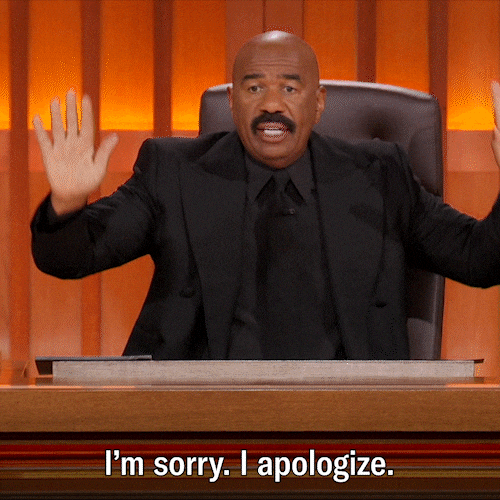 Giphy
GiphyIt’s kind of wild that when you work as a therapist/counselor/coach, a lot of people never really see you as human — and this can include your close relationships. What I mean by that is, it’s almost like they expect you to be free on-call therapy to the point where they “forget” to actually check on you sometimes.
Such is the case with one of my longest-running friendships. Even during the weeks between losing my mother and losing $4K (SMDH), she would just keep calling me to vent about her marriage. I finally got so fed up that I brought it to her attention that for the past couple of years, that is exactly what our friendship has been like: her venting, me listening without her being very invested in my life at all. In response, she texted me an apology — and boy, was it beautiful.
I’m not going to share the details of what she said; however, I am going to tell you three things that it consisted of because it’s what I believe ALL APOLOGIES should entail.
1. She took full ownership for what she believed that she did. I framed this point in this way because, something that everyone needs to forever keep in mind is the fact that two people start and, to a large extent, end relationships — and what I mean by that is, it’s never like one person was perfect and the other was the villain. That said, though, when someone is making an apology to another individual, they are going to own their part and articulate what that part is. It’s not gonna be a simple “My bad.”
It’s going to be “I am really sorry that I wasn’t there for you when you needed me” or “I apologize for taking you for granted” — something that sounds like they get the “offense” that transpired. By doing this, they recognize their missteps — and that is what puts people on the road to not repeating them.
2. She did not deflect or gaslight me. You know what one of the worst apologies are: It’s when someone says they are sorry and then follows it up with, “But you do it too” or “If you hadn’t done ‘A’, I wouldn’t have done ‘B.'” Justifying your actions is a surefire way to make someone believe that you don’t really think that you did something wrong (or that bad) in the first place. And really, how can they trust you (again) if that is how you feel? Oh, and don’t get me on gaslighting.
Ugh, ain’t nothing like someone claiming that they want to set things right with you, only to act like they don’t really get where you are coming from with the issues y’all were having in the first place. A good gaslight line in an apology: “If that is what you think happened, I apologize.” Yeah, you can keep that, jack. Never accept this kind of apology — because it isn’t one.
3. She addressed why she needed to make the apology in the first place. Wanna know one of the main reasons why I don’t trust people who don’t believe in having regrets (check out “Why Regret Might Not Always Be A Bad Thing”)? Did you know that apology means “a written or spoken expression of one's regret, remorse, or sorrow for having insulted, failed, injured, or wronged another.” How, as a human, do you think that you are out here not making any mistakes or poor decisions that you sometimes need to APOLOGIZE for? That is just…insane.
And one of the reasons why apologies are important is because if you feel bad about “failing” someone, it’s usually because you value them enough to want to keep them around. And yes, in my friend’s apology, she also explained why she didn’t want me to feel hurt in the way that she had hurt my feelings and what she would do to prevent that from happening in the first place.
So y’all, with all of this out of the way, before getting deeper into this topic? If an ex is hitting you up to apologize to you for something, please make sure that he hits all three marks of a true apology.
Now let’s keep going.
A Genuine Apology Should Also Include an Amends
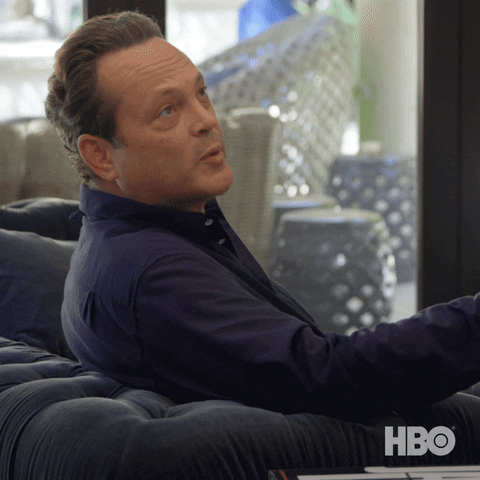 Giphy
GiphyA few years ago, I wrote an article for the platform entitled, “Heads Up: It's NOT An Apology If An Amends Isn't Made.” You know how I mentioned a second ago that a solid apology has no gaslighting in it? Hmph. Ain’t it wild how someone can do something that hurts or harms you and yet, they want you to just “hurry up and get over it”? GASLIGHTING.
Someone in my family, after unpacking years of abuse that I experienced at their hand, they had the nerve to say, “I’m not going to keep apologizing to you for this.” Hmm…Okay. So, how about you let me give you a consistent three months’ worth of the years of mistreatment that I experienced from you and then flippantly throw an apology your way. Let’s see how you feel about it. How much you believe that I am being genuine and sincere.
Listen — and please hear me GOOD on this: when someone really gets the magnitude of the pain or discomfort and inconvenience that they caused, they aren’t going to be fine with just saying that they are sorry for it; they are going to ask you what they can do to set things right.
It’s actually a part of the reason why I named the four children who I aborted (check out “Why I Named The Children I Aborted”) because I do have some real remorse for those decisions. Each of their names have an intentional meaning and I strive to leave out their purpose, through those names, on a daily basis. It’s a small way of making amends.
You know, back when my first book came out, my first love reached out, via email, to send me an apology. The apology hit most of the points that I mentioned earlier. Looking back, there wasn’t an offer to make an amends, though, and trust me, there was A LOT to make up for.
At the end of the day, amends means “reparation or compensation for a loss, damage, or injury of any kind; recompense” and while none of us should use bitterness, resentment or emotional stagnation as the “bar” for which we should expect amends to be made, if you’re trying to figure out just how sincere an ex is with their apology, if they want to do something to make things better, that’s a good sign.
There is a caveat, though.
Discern the Motives. Always.
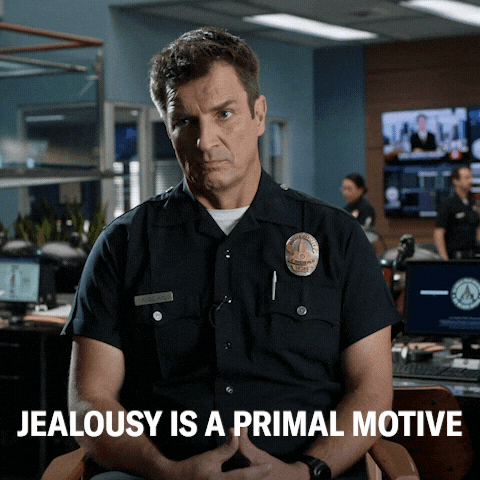 Giphy
GiphyEarlier this summer, I wrote an article for the platform entitled, “What's Your Motive For Sex? (It Reveals A Lot. Trust Me.)” Then, a few weeks ago, I wrote another article entitled, “As Cuffing Season Steadily Approaches, What The Heck Is 'Winter Coating'?” and boy, when I tell you that both of these complement this point really well? Goodness.
If you’ve never heard of the dating trend known as winter coating before, it’s basically when an ex creeps back up around cuffing season — and if you know what cuffing season is all about, you can absolutely connect the very probable motives behind those dots.
Now can there be exceptions? There are ALWAYS exceptions. Still, if you haven’t heard from your ex in years and here he comes a couple of weeks before Christmas, unless the two of you got together or broke up around the holidays, stay on potential “winter coating alert,” because it might not be about “building bridges” so much as getting into your bedroom.
That said, if it’s been a minute (six months or more) since you’ve heard from an ex and he suddenly reaches out to apologize, absolutely take out a moment to discern the motive — and shoot, feel fine with even asking what is causing him to make the move…now. If it’s in the spirit of the holidays and wanting to go into a new year with a clean slate, got it. If it’s because he’s been in therapy and realizes that he didn’t end certain things in his past very well, understood. If it’s because he didn’t like how the two of you broke up and he wants to try and make peace, that’s fair.
On the other hand, if you sense that he wants to rekindle something (check out “Nelly And Ashanti Are Giving It Another Shot? Here's What You Should Know About 'Ex Reconciliation'” and “I'm Thrilled That Ryan Destiny & Keith Powers Are Back Together. 5 Things Before Reuniting With Your Ex, Tho.” and “What Happens When 'The One Who Got Away'...Comes Back?”) — although that’s kind of another article for another time, do check that motive.
When someone apologizes, you should really be the only focus for them; not what they can get out of it on the back end. Listen, even if he hopes to get back with you (or back in bed with you), that shouldn’t be something that is discussed during the apology. If it is said or even implied, something about HIS MOTIVE is disingenuous. And if that is indeed the case, to a valid extent, so is he.
We All Should Give the Grace and Mercy That We Desire
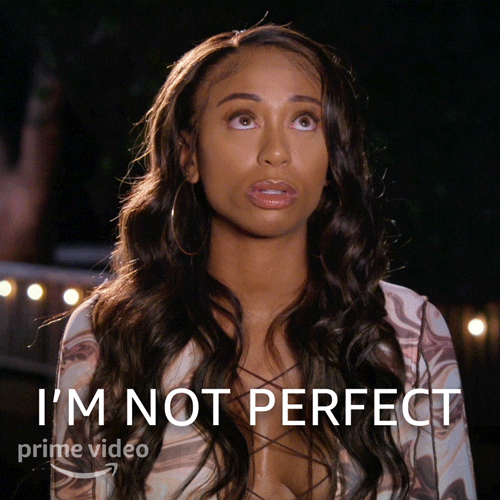 Giphy
GiphySooner than later, I’m going to write an article about forgiveness (beyond what I already have here). For now I’ll just say that if you are someone who thinks that other people don’t deserve forgiveness? That is either your pain or your ego talking and, either way, you can’t trust “their” judgment.
All of us mess up sometimes and if you are a karma (or you reap what you sow) believer, then you absolutely should want to extend others grace and mercy so that you can receive it in your own time of need (and you are absolutely delusional if you think a time won’t come, sooner than you probably think, that you will need it).
Besides, do you know all of the self-inflicted drama and trauma that comes from NOT forgiving others: higher blood pressure, insomnia, stress, anxiety, the higher risk of a heart attack, a weakened immunity, a greater risk for depression and anxiety — whatever he did, is it really worth all of this? Yeah, while a lot of people think that weaponizing forgiveness is empowering, really all it’s doing is putting themselves in harm’s way. Physically. Emotionally. SPIRITUALLY: “For if you forgive men their trespasses, your heavenly Father will also forgive you. But if you do not forgive men their trespasses, neither will your Father forgive your trespasses." (Matthew 6:14-15 — NKJV)
By the way, no one is saying that forgiving that man means that you have to allow him back into your life. After all, access is a privilege. Yet if he comes to you and acknowledges that he feels sorry for some things, for the sake of your own sanity, why not let him express it? Don’t wanna meet up or talk on the phone? Understood. Email and/or text are there for the taking. Don’t want to go back and forth? Who said that it needs to be a discussion or a debate?
All I know is, the more time you spend on this planet, the more you want to put out the energy that you want to come back. Forgiving others tends to make life easier. Not forgiving? Oh, the way that it boomerangs, sometimes in ways you never saw coming, chile. Dodge that kind of experience (and typically hard life lesson) if you can.
Yes, Better Late than Never
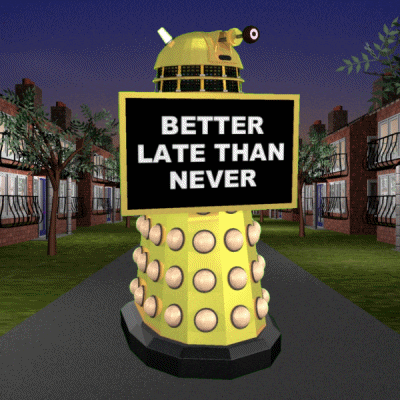 Giphy
GiphyToo late to apologize. Yeah, I don’t really know if there is such a thing (because forgiving and reconciling are not one in the same and some of y’all will catch that later). I’ll wrap this up with a story to prove my point.
Once upon a time, I knew a woman who was in a serious relationship and yet, whenever her boyfriend would bring up the possibility of marriage, she would stall him out. When I finally asked her what her deal was, she explained that she still harbored so much pain from the man before him that she didn’t fully trust that he was the real deal. About five months later, here came her ex with a thorough explanation for why he made some of the decisions that he did while they were together. Now that she had the full story, she was able to heal. She got married to her boyfriend that following year.
You see where I am going with this? Although your ex’s apology might be “late” as far as y’all’s relationship timeline, the timing may be BRILLIANT when it comes to true when and why you actually need it. Yeah, a Scripture that I adore is “Timing is the Father’s business” (Acts 1:7 — Message) and sometimes those apologies, in the grand scheme of things, are more on time than you could ever imagine; they’re when God deems you need them not when you want to have them.
____
It is Oprah Winfrey who once said, “True forgiveness is when you can say, "Thank you for that experience” and sis, if you remove the bitterness and anger and look deeper, there were valuable lessons, even in and from the most challenging relationships. And that is worth appreciating through forgiveness and, if need be, full and complete release.
Bottom line, should you accept an ex’s late apology? Absolutely.
What better way to illuminate your present on a whole ‘nother level.
Just as forgiveness always does.
TRUST ME.
Let’s make things inbox official! Sign up for the xoNecole newsletter for love, wellness, career, and exclusive content delivered straight to your inbox.
Featured image by Shutterstock





